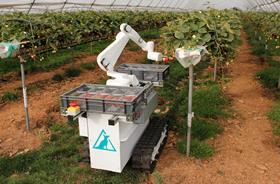
The government will release £90 million for agri-tech innovation and collaboration to help spur the “technology revolution”.
The secretary for business, energy and industrial strategy, Greg Clark, announced the subsidy on the second day of the NFU conference in Birmingham, stating “farming is foundational to our country”.
The new fund aims to bring land users together with expertise in robotics, AI and data science, as labour shortfalls and increasing costs force farmers to adopt leaner practices.
Clarke told the audience: “As someone who has known all my life that farming is foundational not just to our economy, but to our country. Providing the food and drink we live on and stewarding the countryside that is so much part of our national and local identity means there is no more essential industry.
“The agricultural sector is the biggest industrial sector in the UK, Employing almost 4 million people and larger than the automotive and aerospace sectors combined.
“With the technological revolution that is happening, the skills of the farming workforce need to keep pace. New technologies require new abilities and today’s modern British farmer is a Swiss-Army-Knife of skills. An engineer, an environmentalist, a data scientist a biochemist, an energy producer, a tourism entrepreneur, and an investor too.
“As part of the Industrial Strategy, we announced a Transforming Food Production Challenge and I’m delighted to announce the government will invest £90 million to make this challenge a reality.”
The government unveiled new “Challenge Platforms” as network hubs for businesses, farmers and academics. It also committed to support “Innovation Accelerators” to explore the potential of new tech ideas.
The agri-tech industry is expected to grow to around $28 billion dollars by 2025, as technology advances make widespread automated farming increasingly feasible.
Many industry figures believe it reasonable to expect farming will be largely automated within our lifetimes.
Clark highlighted data projects such as Agricultural Engineering and Precision Innovation Centre as examples of leading the way in precision agriculture, as well as apps such as CROPROTECT, which allow farmers to share data.



